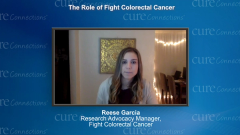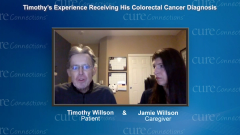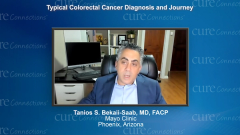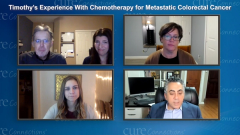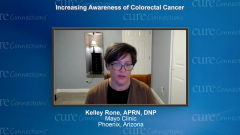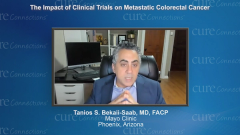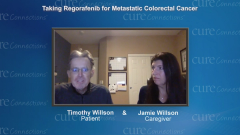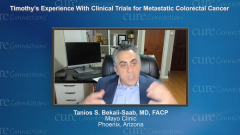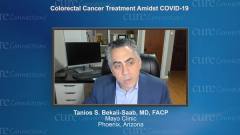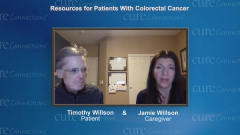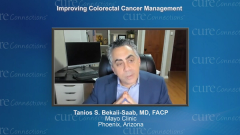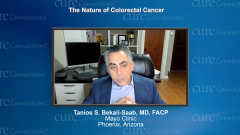
The Nature of Colorectal Cancer
Episodes in this series

Tanios S. Bekaii-Saab, MD, FACP: Kelley, you have been doing this for a while, taking care of a lot of patients. Talk about the nature of colon cancer. You treat various gastrointestinal cancers. What is particularly different or differentiating about care for colorectal cancer in the clinic?
Kelley Rone, APRN, DNP: Patients with colorectal cancer tend to have a lot of body changes. When they have surgery, they may have a permanent colostomy or a temporary colostomy, but it is something that they have to learn how to manage, and it can often be quite disturbing for people that they have this new process to deal with. Starting treatment, there tends to be a lot of information thrown at people at the beginning, so it is a lot for people to absorb, especially when they are starting.
Tanios S. Bekaii-Saab, MD, FACP: You are absolutely right. This is a cancer that involves the intestines, so all functions of the intestines can be disrupted. It can certainly be quite disruptive for life and quality of life. As we know, colon cancer in the United States and the world is one of the most common cancers. Over 150,000 patients every year get diagnosed with this cancer, so it is a pretty large practice with quite a few patients. This cancer can have, for some, a genetic etiology, meaning that they inherited it or were at risk for it because someone in their family may have had it. The majority of the patients have no genetic link. In fact, for most of the patients we treat, we are unable to identify a clear risk factor. There are a number of risk factors that have been postulated that may link to it from eating too much meat, but that gets debunked in other studies and gets validated in some to certain lifestyle issues. For genetically driven cancers or for inherited cancers, Lynch syndrome is most prominent, but there are others as well. As I said, it is mostly unknown why folks get colon cancer, and we are still trying to learn.
One thing is that we are seeing more and more of these cancers coming early. We are seeing patients—and Kelley can vouch for this—in their 20s, 30s, and 40s presenting with this cancer, oftentimes with metastatic disease, more and more of them. That is a trend that we are seeing across the nation and now across the world as well. A lot of thought is going into this. Is this a lifestyle change? Over the last two or three decades, we have changed our diets, and we have changed our activity levels: We sit more, we play more video games, we watch more TV, and we eat stuff that does not make much sense in some ways and have affected our microbiome adversely. The microbiome is this microbial component of the colon that essentially keeps it healthy, and it has been postulated that eating meat that is injected with antibiotics or drinking milk with hormones could affect and change the microbiome, and that could be part of the equation. There are a lot of reasons why this could be. Kelley, we are seeing quite a few patients who are younger and younger.
Kelley Rone, APRN, DNP: The youngest patient I have is 27, and the oldest is 90, so it does not seem to discriminate. It seems that the younger patients are often diagnosed with metastatic disease because nobody is looking at a 27-year-old to have colon cancer, so their diagnosis tends to be delayed.
Tanios S. Bekaii-Saab, MD, FACP: Yeah, like for hemorrhoid, people think this may be just a flare of hemorrhoids or what have you, so they tend to pay less attention. Screening for colon cancer is now advocated for starting at age 45 by certain agencies. For African Americans, definitely. For the overall population, I say for folks to remind their friends to start getting screened at 40. I would not be surprised if this age continues to get younger. Tim, did you know anything about colon cancer? Did you even think about this being something that would happen to you prior to being diagnosed?
Timothy Willson: I did not. In my mind, I was more thinking that, traditionally, it was for older patients, so I did not need to worry about it yet. I had just turned 50, and I had not had a colonoscopy yet.
Tanios S. Bekaii-Saab, MD, FACP: That is young.
Timothy Willson: The people at the hospital where I was being treated said that it does not look like that, that it looked like some kind of blockage. I did not think it was colon cancer. Even when I was at the hospital, I did not think of it. As you mentioned, I thought it was for people who eat a lot of red meat or maybe drink too much, that type of thing. But I knew it was a lethal cancer, and it was second after lung cancer. It was always in the back of my mind: age 50. It was so well publicized that you have to get a colonoscopy when you are 50. I do not know if it would make a difference. I was six months over 50, but I had it on my calendar to do it that year. I knew it was the second leading cause of deaths with cancer, and it was something that, as you hit 50, you need to think of all the things that you need to do, and that was definitely one of them.
Transcript Edited for Clarity

